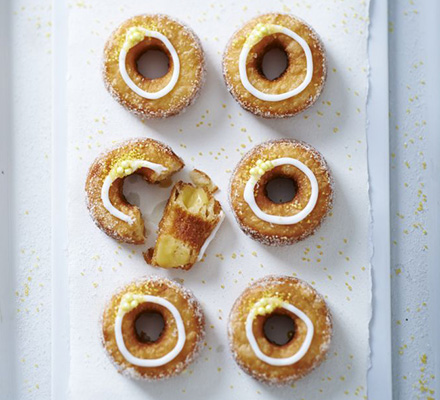Doughsant
What could be more indulgent than a croissant a doughnut combined? Edd Kimber's cheat's dough gives wonderful crisp layers
-
Prep:1 hrs 15 mins
Cook:45 mins
plus cooling and proving, 4-5 hrs resting and overnight chilling - A challenge
Nutrition per serving
-
kcal 572
-
fat 37g
-
saturates 17g
-
carbs 55g
-
sugars 19g
-
fibre 2g
-
protein 7g
-
salt 0.5g
Ingredients
- 125ml milk, at room temperature
- 2 x 7g sachets dry active yeast
- 250g plain flour, plus a little for dusting
- 250g strong white bread flour
- 60g golden caster sugar
- 300g unsalted butter, cut into cubes and chilled
- vegetable oil
- 2l vegetable oil
- granulated sugar, for dusting
- filling of choice (we used lemon curd but jam, dulce de leche or hazelnut chocolate spread works well)
- 125g icing sugar
- choice of edible pearl balls or sprinkles (we used Dr. Oetker)
Method
Put the milk, 125ml lukewarm water and yeast in a medium bowl and mix to combine, then set aside. Put the flours, sugar and 1 tsp salt into the bowl of a food processor and pulse to combine. Add the cubed butter and pulse until it’s in small pieces. Alternatively, rub in by hand. This is the important stage: you’re not making a bread or a pastry, so don’t over-process the mixture – you need to see chunks of butter around 1cm in size.
Tip the flour mixture onto the milk mixture. Using a spatula or bread scraper, gently fold the dry mixture into the liquid, trying to moisten everything without making the butter any smaller. Once everything is combined into a rough dough, tip the mixture out onto the work surface and lightly knead together to form a ball. Cover with lightly oiled cling film and pop in the fridge for a couple of hours to rest.
On a well-floured work surface, roll the dough out into a roughly 20 x 40cm rectangle. Fold in thirds, like a business letter, brushing off any excess flour. Turn the dough through 90 degrees so that the folds are facing you. Repeat the rolling, folding and turning process twice more. Wrap the dough in cling film and chill overnight before using.
Lightly dust the work surface with flour and roll out the dough to a 20 x 45cm rectangle about 0.5cm thick. Using a 9cm cookie cutter, cut out 10 doughsants. Using a 2.5cm cutter, cut out the hole in each. Arrange on a tray, cover with lightly oiled cling film and allow the doughnuts to prove at room temperature until puffed up – around an hour. When ready to fry, fill a large, thick-bottomed saucepan two-thirds full with vegetable oil, place over a medium heat and bring to 170C on a sugar thermometer. Fry the doughsants 1 or 2 at a time, lowering them in with a slotted spoon.
Fry the doughsants for 1-2 mins each side or until deep golden brown (step 8). Using a metal slotted spoon, remove from the pan and place on a wire rack covered with kitchen paper. Once cooled slightly but still warm, roll the edges of the doughsants in granulated sugar, then set aside to cool completely.
To fill, place your filling of choice into a piping bag fitted with a Bismarck tip (a long thin piping tip used for doughnuts) or a small round piping nozzle. From the bottoms, push the tip into the doughsant at north, south, east and west, piping in a little filling. To decorate, add water to the icing sugar 1 tsp at a time and mix until you have a thick paste the consistency of toothpaste. Pipe a ring of icing on each and top with a few edible pearl balls and some sprinkles. Best served within a couple of hours of frying so that they keep their crispness.





















